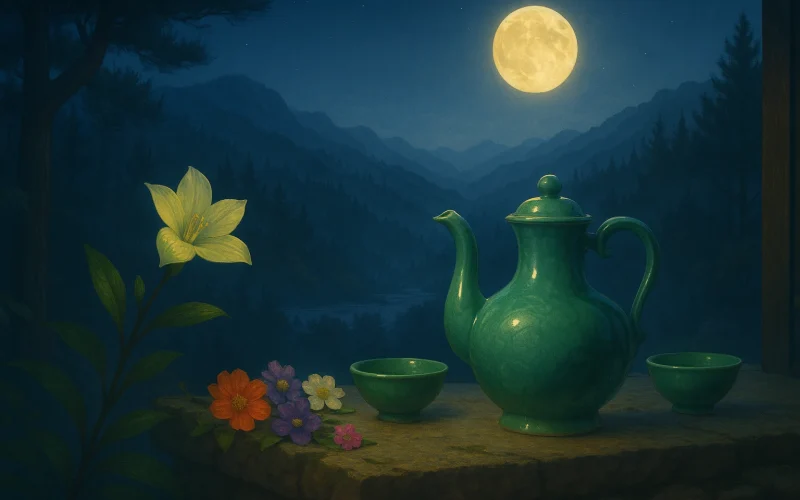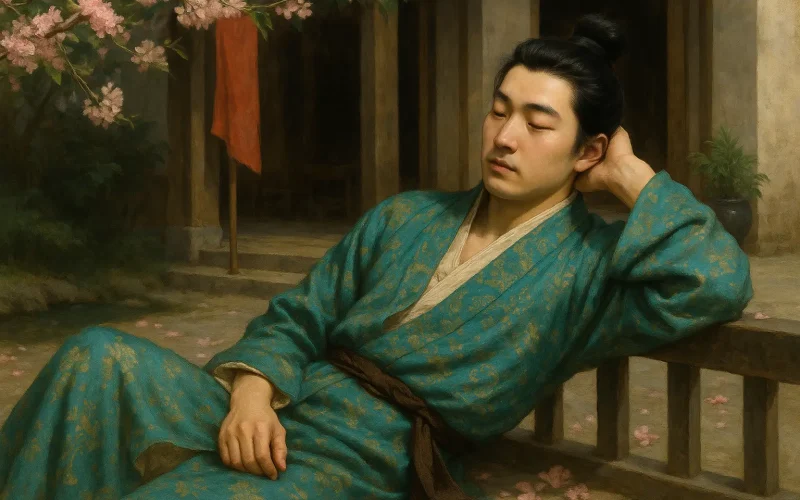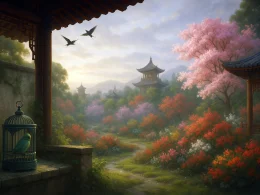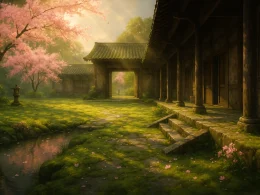The Yue Kiln opens to autumn's wind and dew so deep,
It captures the emerald hue of a thousand peaks' steep.
Fit to hold the midnight dew, pristine and clear,
And rival Ji Kang's famed cup, without a peer.
Original Poem
「秘色越器」
陆龟蒙
九秋风露越窑开,夺得千峰翠色来。
好向中宵盛沆瀣,共嵇中散斗遗杯。
Interpretation
Living in the late Tang Dynasty—a time of social unrest, political corruption, eunuch dominance, and regional warlordism—Lu Guimeng found himself unable to realize his ambitions. After early career setbacks, he retreated to Songjiang’s Fuli, expressing his ideals through poetry. He often used objects to convey his aspirations, turning either natural beauty or human artifacts into spiritual symbols. "Secret-color porcelain" represented the pinnacle of Yue kiln celadon, with a glaze so moist and green that Song dynasty admirers called it "the blue of a thousand peaks." Upon first seeing it, the poet was struck by its luminous color, using its beauty to embody his own noble character and recalling the aloof integrity of the Wei-Jin scholar Ji Kang, thereby expressing his refusal to compromise with the powerful.**
First Couplet: "九秋风露越窑开,夺得千峰翠色来。"
Jiǔ qiū fēnglù Yuè yáo kāi, duó dé qiān fēng cuì sè lái.
The Yue kiln opens to the autumn wind and dew;
It seizes the verdant hue of a thousand peaks.
This couplet describes the glaze’s beauty. The word "seizes" (夺 duó) is particularly vivid, emphasizing that the color seems not man-made but captured from nature itself. Through hyperbole, the poet highlights the porcelain’s rarity and subtly metaphorizes the noble quality forged in fire and hardship.
Second Couplet: "好向中宵盛沆瀣,共嵇中散斗遗杯。"
Hǎo xiàng zhōngxiāo chéng hàngxiè, gòng Jī Zhōngsàn dòu yí bēi.
How fine it would be to fill it with midnight dew,
And share a cup with Ji Zhongsan, matching his legacy.
Here the focus shifts from object to emotion. "Midnight dew" (沆瀣 hàngxiè) refers to the purest night air, often symbolizing lofty and clear spirit. Ji Zhongsan is Ji Kang, a Wei-Jin scholar known for his love of wine and zither, his outspoken integrity, and his eventual execution by the Sima regime. The poet imagines using the porcelain to hold dew and drink with Ji Kang, expressing both admiration and his own ideal: to maintain moral pride amid turmoil rather than serve those in power.
Holistic Appreciation
This poem uses the "secret-color porcelain" as an object of praise to convey ideal character. The first couplet intensely describes the vessel’s beauty, with "verdant hue of a thousand peaks" evoking the glaze’s moist and jade-green quality, elevating craftsmanship to a marvel of nature. The second couplet moves from object to person, using Ji Kang as a spiritual reference and projecting the aspiration for moral nobility into an imaginary sharing of drink.
The poet uses the vessel to express his ambition, mirroring his own circumstance of unrecognized talent and his devotion to purity. The poem blends realism and idealism: it captures the authentic features of Yue ware while investing it with the symbolic significance of Wei-Jin scholar demeanor. The whole piece radiates artistic charm and reflects the cultural psychology of late Tang literati—self-aware, morally lofty, and detached from the world.
Artistic Merits
- Object as a Vessel for Emotion, unity of thing and self: Surface description of porcelain implies human character; the noble glaze reflects the poet’s ideal personality.
- Exaggerated imagery, rich imagination: "Seizes the verdant hue of a thousand peaks" exaggerates the glaze’s beauty as if drawn from nature, enhancing visuality and impact.
- Precise allusions, profound meaning: The mention of Ji Kang symbolizes scholarly integrity and uses his tragic fate to reflect the poet’s own situation.
- Concise language, subtle and lasting: Twenty-eight characters embrace nature, artifact, and life ideal, showing high artistic concentration.
- Balance of philosophy and aesthetics: The porcelain’s genesis in fire parallels the scholar’s refinement through adversity, giving the poem both aesthetic and philosophical value.
Insights
The beauty of external objects can symbolize inner character. Lu Guimeng uses the beauty of Yue porcelain to reflect Ji Kang’s integrity, thereby asserting his own ideals of purity and pride. Reading this poem, we appreciate not only the Tang poets’ detailed observation and artistic elevation of objects but also a spiritual stance—maintaining moral purity and independence in a disordered world.
About the Poet
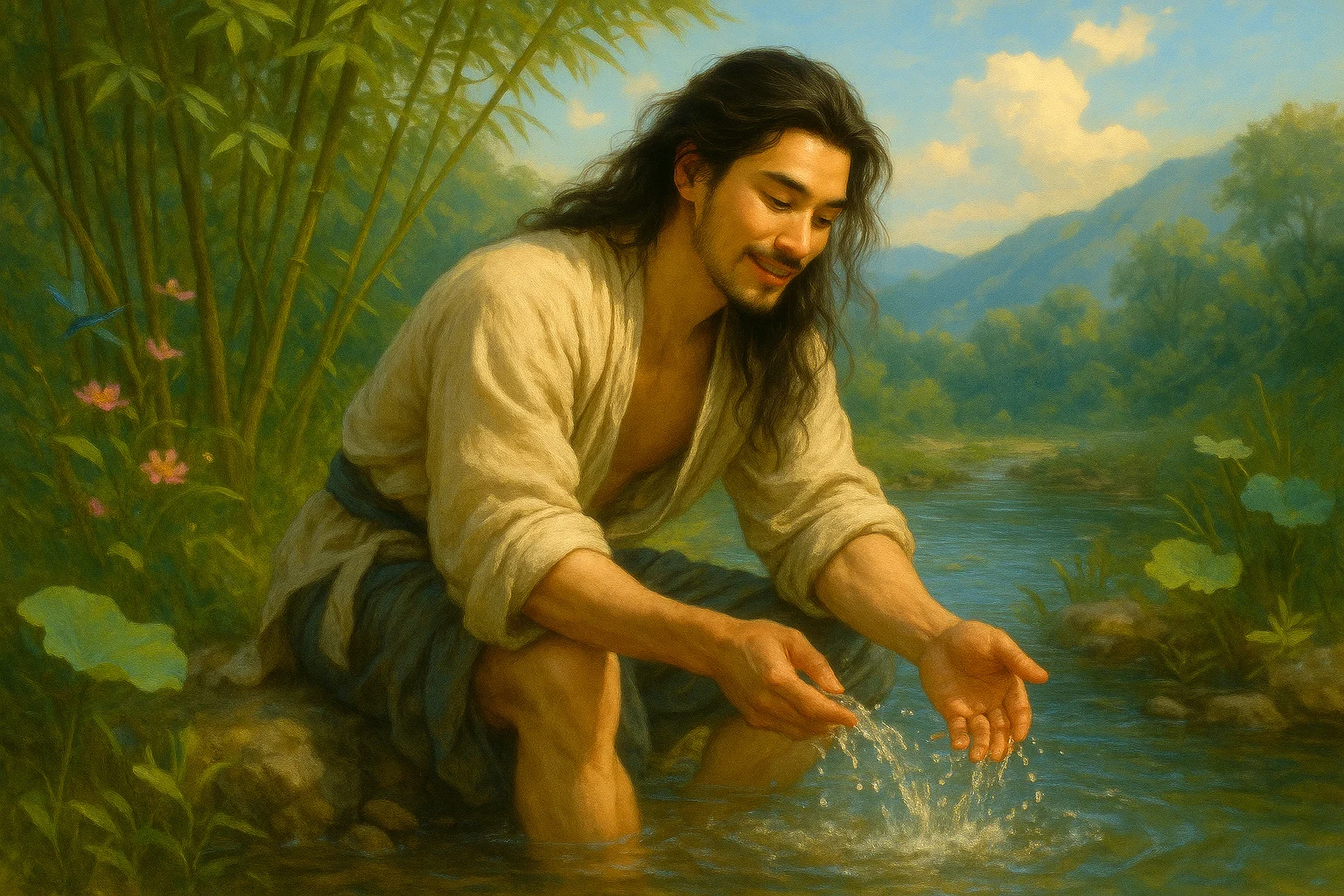
Lu Guimeng (陆龟蒙 ?– c. 881 CE), a native of Suzhou, Jiangsu, was a Late Tang dynasty writer and agronomist. After failing the imperial examinations, he retreated to a reclusive life in Puli, Songjiang. He formed a famous literary partnership with the poet Pi Rixiu, and the pair are often referred to collectively as "Pi-Lu." His poetry is known for its social satire and a style that is incisive yet subtly restrained. His inclusion in the Biographies of Talents of the Tangunderscores his significance. The modern writer Lu Xun famously praised his essays, noting that they provided "a sharp radiance piercing through a world of muddle". Lu Guimeng is regarded as a uniquely distinctive voice in the literary scene of the late Tang.






